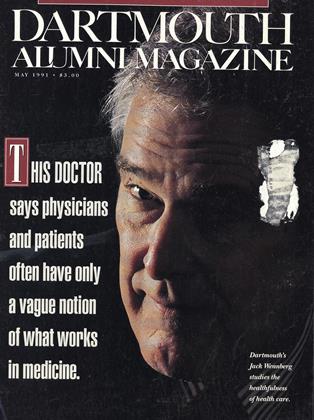By marrying laser-disk technology to the computer, researchers at Dartmouth and Harvard created an interactive video that helps patients choose their treatment for prostate disease. Hosted by Dr. Charles Culver, a Dartmouth Medical School professor of psychiatry and a medical ethicist, the film stars a number of retired Dartmouth professors. "I don't go through a three-hour movie without having to leave," one of them confides to the camera. Another crows about his regained ability "to put my initials in the snow."
The program is the harbinger of a major new medical project the Foundation for Informed Medical Decision Making, or FIMDM (pronounced fim-dim), a private, notfor-profit foundation set up by Wennberg and his colleagues. Its goal is to reshape the way most medical decisions have traditionally been made, with patients expecting doctors to tell them what's good for them and physicians readily complying.
Through ventures like the prostate videodisk, FIMDM wants to support shared decision-making between doctors and patients, in the belief that such a process would foster better medicine. Wennberg and colleagues are now developing similar videodisks about treatment options for lower-back pain, mild hypertension, and breast cancer, and they plan to update and expand their first disk to incorporate newer options for treating ailing prostates, such as balloon dilations and pharmaceutical drugs. Patients who have seen the prostatectomy disk are enthusiastic: "They ought to do this for every problem that the human body faces as you progress through life," says Franklin Harrison, 68, of Athens, Vermont, who after seeing the video put off surgery.
According to Joseph F. Kasper, FIMDM's president and adjunct professor of engineering at the Thayer School, the foundation hopes to raise $5 to $7 million to create a "library" of 25 to 30 disks that could be used in doctors' offices. A special focus could be explaining treatments to elderly patients; Wennberg, who is FIMDM's vice chairman, wants to create one to explain the implications of "advance directives," the legal documents that patients sign stating their preferences for medical care if they become incompetent. The foundation is negotiating with a major international electronics company, which may license the rights to distribute the disk in the U.S., paying fees to FIMDM as a way of financing the production of more videodisks and their underlying computer programs.
The video disk lays out the odds of risksand benefits from various treatments.
Summertime, and the peeing is easy,"sings a former patient for the camera.
The computerized disk shows variousprocedures in detail, "empowering"patients to make treatment decisions.
 View Full Issue
View Full Issue
More From This Issue
-
 Cover Story
Cover StoryDOCTOR WENNBERG'S UNCERTAINTY PRINCIPLE
May 1991 By Susan Dentzer '77 -
 Feature
FeatureTHE BLUE ZOO
May 1991 By Robert Eshman '82 -
 Feature
FeatureStory Time
May 1991 By Nancy Millichap Davies -
 Article
ArticleDR. WHEELOCK'S JOURNAL
May 1991 By "E. Wheelock" -
 Article
ArticleTHEATERS OF WAR
May 1991 By Professor Lynda Boose -
 Class Notes
Class Notes1980
May 1991 By Michael H. Carothers







